|
|
|
Sort Order |
|
|
|
Items / Page
|
|
|
|
|
|
|
| Srl | Item |
| 1 |
ID:
108814
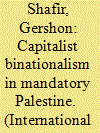

|
|
|
|
|
| Publication |
2011.
|
| Summary/Abstract |
In response to the outbreak of the Arab Revolt of 1936, a coterie of five prominent entrepreneurs and intellectuals in the Mandatory Jewish community formulated a capitalist binationalist resolution of the Israeli-Palestinian conflict. This paper examines the genesis of and debate over the little-known Concord they proposed and compares it with better-known liberal and socialist binationalist plans. "The Five," as they came to be known, were the only binationalists seeking to base political parity on economic integration. The occasion of their blueprint allows further exploration of the preconditions for an effective binationalist program, among them the structure of labor markets, political preferences of minorities and majorities in regard to sovereignty, and levels of mutual trust. Ultimately, binationalist resolutions of the Israeli-Palestinian conflict were precluded by the Labor Settlement Movement's separatist state-building strategy.
|
|
|
|
|
|
|
|
|
|
|
|
|
|
|
|
| 2 |
ID:
133970
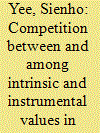

|
|
|
|
|
| Publication |
2014.
|
| Summary/Abstract |
Recently there has been a great deal of talk about visions and alternative visions of the world and the values involved in each vision.1 Obviously it is important for us to see clearly the various visions of the world. But the picture is quite murky and there is really no end to history, and there will be no conquering of one vision over another anytime soon. In the meantime, it is more important for us to be good decision-makers in any vision of the world that we find ourselves in, or choose to live in. To illustrate, if we are capitalists, we'd better be good capitalist decision-makers; if we are socialists, we'd better be good socialist decision-makers.
|
|
|
|
|
|
|
|
|
|
|
|
|
|
|
|
| 3 |
ID:
130579
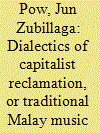

|
|
|
|
|
| Publication |
2014.
|
| Summary/Abstract |
One of the initiatives used by the Singapore government to fortify its own position has been to promote Malay culture. This has been done by strengthening the Malays' attachment to their indigenous culture and also by introducing the customs and practices of the racial minority to non- Malays. This article traces the genealogy of cultural engineering by the state from the 1960s to the present, and argues that the persistence of late capitalism has retained the material dialectic between the political and the popular. Focusing on the local practices of the gamelan and angklung-kulintang, the article explores paradoxes in the way these musical genres are being promoted today by a new generation of non-Malay descendants, who have also become the cultural sculptors of Malay identity for international spectacles.
|
|
|
|
|
|
|
|
|
|
|
|
|
|
|
|
| 4 |
ID:
134154
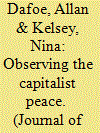

|
|
|
|
|
| Publication |
2014.
|
| Summary/Abstract |
Countries with open capital markets tend to have fewer militarized disputes and wars. Gartzke, Li & Boehmer propose that this association arises from the enhanced ability of states with open capital markets to credibly signal resolve through the bearing of economic costs ex ante to militarized escalation. We test this causal mechanism by qualitatively examining six crucial cases in which the mechanism is most likely to be operative and observable. We employ a formal case selection strategy designed to yield cases with high inferential leverage for our confirmatory test and to select cases for an exploratory analysis of scope conditions. Through analysis of media reports, government documents, and other sources, we evaluate the extent to which relevant individuals drew the appropriate inferences about market-mediated costs and resolve. We conclude that while market-mediated signaling may operate in major conflicts, it is unlikely to account for much of the association between capital openness and peace. Exploratory analysis of our cases identifies potential scope conditions, clarifies the role of different signaling mechanisms, and suggests other explanations for the peaceful behavior of countries with open capital markets.
|
|
|
|
|
|
|
|
|
|
|
|
|
|
|
|
| 5 |
ID:
106931
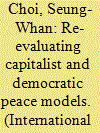

|
|
|
|
|
| Publication |
2011.
|
| Summary/Abstract |
After replicating Oneal and Russett's (International Studies Quarterly, 41, 1997, 267; Journal of Peace Research, 36, 1999, 423) democratic peace model, Gartzke's (American Journal of Political Science, 51, 2007, 180) study contends that "capitalism, and not democracy, leads to peace. Additional research is needed to corroborate, extend, and even refute the findings reported here." In response to this open invitation, this study re-evaluates Gartzke's capitalist peace model along with Oneal and Russett's democratic peace model. This study identifies that while the capitalist peace model suffers from model misspecification, observation omission, and sample selection bias, the democratic peace model commits measurement error. After correcting these four problems, this study uncovers that while capitalism does not emerge as a cause mitigating militarized disputes or wars in a consistent manner, democracy does.
|
|
|
|
|
|
|
|
|
|
|
|
|
|
|
|
|
|
|
|
|